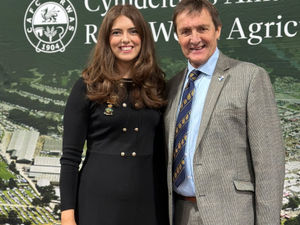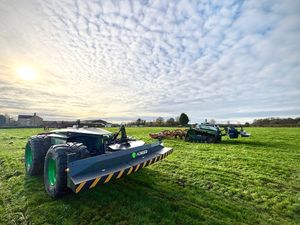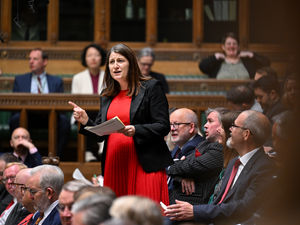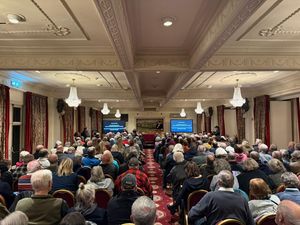No-till regime improving crop yields and soil structure
Ownership of Overbury Estate, which lies on the southern side of Bredon Hill close to Tewksbury, can be traced back to 1723 when John Martin, a London banker with Evesham connections, came to live there and it has passed down through the generations to Penelope Bossom who now runs Overbury Enterprises, a family partnership of rural businesses which includes the farming operations.
The lower part of the Overbury 1565-hectare farm is 200 feet above sea level but rises to nearly 1000 feet at the top of Bredon Hill. The soils varying from Evesham clay and sandy loams on the lower land to Cotswold Brash at the top of the hill, with an annual rainfall of 700mm.
The farm is managed by Jake Freestone who gained an agricultural degree at Seale Hayne and after another management post moved to Overbury in 2003. The farm is run in a sustainable way based on LEAF Integrated Farm Management principles and became a LEAF Demonstration Farm in 2012. There is a considerable area of Higher Level Stewardship and ELS for field margins with some land in an arable reversion scheme.
Production is tailored to meet specific premium niche market opportunities as a way of increasing profitability, with some cereal grown for seed or malting and oilseed rape for LEAF Marque edible oil.
There is a large area of permanent grassland on the escarpment between the bottom land and the top of the hill which is utilised by flock of 1100 ewes, which also play an important role in the arable rotation building up organic matter particularly on the thin soils during winter.
The flock consist of North Country Mules, Texel cross ewes, with Texels used as terminal sires. Recently there has been an introduction of Innovis genetics into the ewe flock as a way of increasing production and profitability. The ewes are scanned and shorn before being housed prior to lambing, with the lambs fattened on forage crops. The lambs are marketed deadweight through the May Hill Sheep group to Sainsbury’s.
In 2014 a Nuffield Farming Scholarship took Jake on an extensive global trip to try to unravel the reasons why, despite the potential genetic increases in wheat yields, UK yields had plateaued. He visited Alberta, Oklahoma and New Zealand and found that farmers using methods which reduced soil disturbance to reduce compaction and soil erosion, had longer rotations which included legumes, grass and cover crops.
He came back from his travels convinced that good soil management was paramount to increasing yield potential and became a great advocate of using a spade to look at the soil profile and a digital soil density probe to detect compaction and panning.
But how has Jake interpreted and put into action what he had seen during his travels?
The plough has gone in favour of no-till regimes, he is using cover crops and has adopted a longer crop rotation, including spring crops of barley and peas. This approach was influenced by what he had seen overseas where the approach improves soil structure, increases soil organic matter, increases worm and soil bacterial activity, increases yields, reduces erosion and costs.
To be able to make the change, they imported a six-metre Cross-slot drill from New Zealand which is used to drill cover-crops straight into the stubble immediately after the grain has been harvested by a John Deere F685, fitted for yield mapping or is used to drill cereal crops direct into oil seed rape stubbles. Using the Cross-slot drill, cereal crops are direct drilled into the cover crops established a few weeks earlier after the previous crop has been combined.
As well as re-equipping the farm machinery to match the new farming no plough era, a new state of the art sophisticated cleaning, drying and storage facility was built in time for the 2017 harvest. It has storage for 1000 tonnes including five 500-tonne bins with underfloor ventilation. This facility enables them to segregate specific crops for specific high value market outlets such as the malting barley which is sold to Molson Coors Brewery at Bunton on Trent through the Molson Coors Growers Group to produce Carling and Coors Light beers.
Having moved away from a more conventional way of cereal production to no-till crop production, there has been a considerable saving in time in establishing crops and a reduction in costs such as tractor fuel and other machinery costs and has allowed the staff of three tractor drivers, a mechanic/sprayer operator and a shepherd achieve a high level of efficiency.
The success in improving yields, productivity, profitability and sustainability of Overbury farming has been through making the most of opportunities and innovating, monitoring, attention to detail and not being afraid of making changes.
Being public spirited, Overbury Estate encourages visitors, takes part in Farm Sunday, LEAF visits and has a special lambing day in April, including tractor trips to see the ewes and lambs out at grass. As well of the on-farm publicity, Jake is a great advocator of using social media, particularly Facebook where the site is regularly up-dated, and is full of interest and is an excellent way of keeping the public informed as to what is happening on the farm and explaining why.





